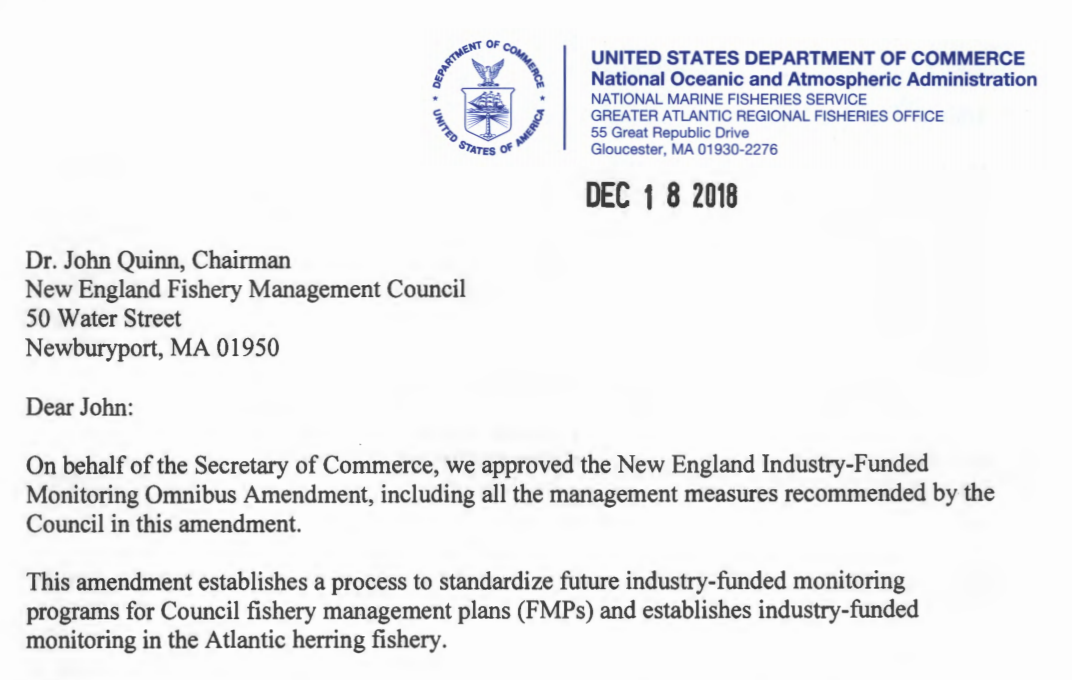In a letter acquired by Cause of Action Institute (CoA Institute), it appears that the National Oceanic and Atmospheric Administration (NOAA) and the U.S. Department of Commerce have approved a controversial fishery management proposal while ignoring public comments critical of the plan. This approval also seems to have been issued before the close of a second public comment period for implementing regulations. The NOAA rulemaking is expected to seriously impact commercial fishing on the Eastern seaboard by applying costly new burdens on fishermen.
The Background
In September 2018, the New England Fishery Management Council (NEFMC), in coordination with the National Marine Fisheries Service (NMFS), a component of NOAA, sought approval for a controversial set of regulatory measures known as the New England Industry-Funded Monitoring Omnibus Amendment. The Omnibus Amendment would create a new financial burden on fishermen by mandating that they pay as much as $810 per sea day for at-sea monitoring in the Atlantic herring fishery. It would also create a standardized process for introducing similar costly monitoring requirements to other New England fisheries.
CoA Institute argued in its initial public comment on the Omnibus Amendment that the burdensome monitoring would unfairly and unlawfully restrict economic opportunity in the fishery. Aside from the questionable legal authority to create this effective new tax on fishermen, the $810-per-sea-day cost has the potential to wipe out the narrow margins that small-scale fishermen rely on to survive.
Following the publication of the notice of availability for the Omnibus Amendment, but before any approval decision was made, the agency oddly proposed implementing regulations in November 2018. Again, CoA Institute filed a public comment in opposition to the regulations.
CoA Institute’s second comment reiterated the legal infirmities with the funding scheme and, among other things, highlighted fatal flaws in the rulemaking’s Environmental Assessment. For example, after NEFMC’s adoption of the Omnibus Amendment’s herring measures, herring quota was reduced by more than 50%. The Council and NMFS plan to lower the annual catch limit even further over the next three years. By some estimates, these new cuts could reduce herring revenue by up to 87%. Such a loss in profitability on top of the costs associated with industry-funded monitoring would cripple fishermen who rely on the industry. Yet the government has done nothing to address these concerns or dilemma.
The Letter
Now, CoA Institute has discovered a letter from Michael Pentony, the Regional Administrator for NMFS’s Greater Atlantic Regional Office, which suggests that the Commerce Department has already approved the Omnibus Amendment, despite the fact that nothing has been published in the Federal Register, posted to NMFS’s herring bulletin, or communicated to the general public.
This supposed “approval” of the Omnibus Amendment ostensibly occurred on or around December 18, 2018, nearly a week before the close of public comment on NMFS’s implementing regulations. Given the agency’s publication of a notice of availability, and its solicitation of public comments on the substance of the Omnibus Amendment, it should also have published its approval decision for the fishery management plan in the Federal Register.
The fact that NMFS secretly approved the Omnibus Amendment, perhaps to avoid public outcry, only adds to concerns surrounding its decision to propose implementing regulations before publicly approving, in part or in full, the amendment’s various management measures, including industry-funded monitoring. Taken together, these facts strongly suggest the government prejudged the legality of the Omnibus Amendment and intended to force it through no matter the pushback. Indeed, it seems the government never planned to give adequate attention to the concerns raised by stakeholders, including CoA Institute. Those concerns certainly went unaddressed in the newly discovered letter.
The Questions
Administrator Pentony’s letter indicates that NMFS does not have adequate funding to administer the at-sea monitoring and portside sampling programs in the herring fishery for the current fishing year, which already started on January 1, 2019. Instead, NMFS would plan to implement the industry funding requirement in 2020. This estimated date of implementation, however, assumes that the Omnibus Amendment will not face challenge in the courts. CoA Institute has filed a Freedom of Information Act request for background information on the December 18, 2018 letter, and the possible reasoning for why the agency has yet to make any public announcements. We will provide additional details as they become available.
Ryan P. Mulvey is Counsel at Cause of Action Institute
